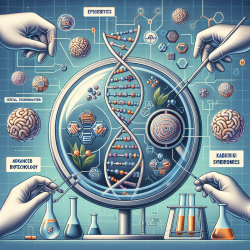In the realm of neurodevelopmental disorders, CHARGE and Kabuki syndromes present unique challenges due to their overlapping clinical features. Recent research has unveiled gene-specific DNA methylation signatures that not only differentiate these conditions but also open new avenues for therapeutic interventions. This blog explores how practitioners can leverage these insights to improve therapeutic outcomes.
Understanding the Research
The study titled "CHARGE and Kabuki Syndromes: Gene-Specific DNA Methylation Signatures Identify Epigenetic Mechanisms Linking These Clinically Overlapping Conditions" provides a comprehensive analysis of the DNA methylation profiles associated with these syndromes. The research identifies distinct DNA methylation (DNAm) signatures linked to mutations in the CHD7 and KMT2D genes, which are responsible for CHARGE and Kabuki syndromes, respectively.
The findings reveal that these DNAm signatures are highly specific and sensitive, allowing for differentiation between pathogenic mutations in these genes from benign variants. This molecular distinction is crucial in cases where clinical diagnosis is challenging due to overlapping features between the two syndromes.
Implications for Practitioners
For practitioners working with individuals diagnosed with CHARGE or Kabuki syndrome, integrating these epigenetic insights can significantly enhance diagnostic accuracy and treatment strategies. Here are some ways practitioners can apply these findings:
- Improved Diagnosis: Utilize DNAm signatures as a molecular tool to distinguish between CHARGE and Kabuki syndromes, especially in early life stages when clinical features may not be fully apparent.
- Targeted Therapies: Explore potential therapeutic interventions that target specific epigenetic mechanisms identified in the study. For example, histone deacetylase inhibitors have shown promise in reversing neurodevelopmental deficits in similar conditions.
- Research Collaboration: Engage in collaborative research efforts to further investigate the role of DNAm signatures in other neurodevelopmental disorders. This could lead to broader applications of epigenetic therapies.
Encouraging Further Research
The potential of DNAm signatures extends beyond diagnosis; it offers a pathway to understanding disease pathophysiology at a molecular level. Practitioners are encouraged to delve deeper into the epigenetic landscape of neurodevelopmental disorders and consider participating in studies that explore novel therapeutic approaches.
To read the original research paper, please follow this link: CHARGE and Kabuki Syndromes: Gene-Specific DNA Methylation Signatures Identify Epigenetic Mechanisms Linking These Clinically Overlapping Conditions.










